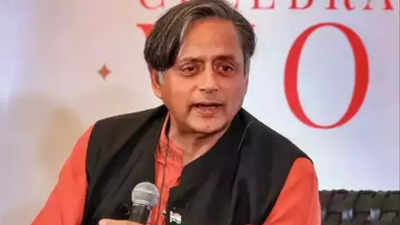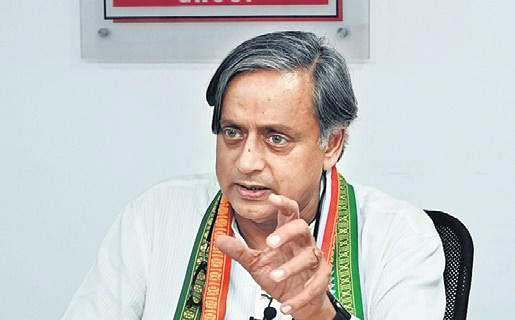Shashi Tharoor criticises circulation of his cropped image with Mahua Moitra, terms it ‘cheap politics’

Shashi Tharoor criticises circulation of his cropped image with Mahua Moitra, terms it ‘cheap politics’
The recent incident involving the circulation of cropped images of Congress Working Committee member Shashi Tharoor and Trinamool Congress MP Mahua Moitra on social media has drawn criticism from Tharoor, who characterized it as an act of “cheap politics.”
The dissemination of manipulated or edited images, particularly in the context of political discourse, has become a prevalent tool for discrediting or misrepresenting public figures, highlighting the increasingly contentious nature of online political engagement.
Tharoor’s clarification regarding his presence at Moitra’s birthday party, attended by a small gathering of approximately 15 people, including his sister, aims to provide context and dispel any misconceptions or misinterpretations arising from the circulated images. His response underscores the importance of context and the need to present a comprehensive picture to prevent the misrepresentation of events and individuals.
The reference to the circulation of cropped images as a means of trolling emphasizes the potential impact of digital media in shaping public perceptions and narratives. Tharoor’s vocal criticism of the act not only highlights the personal ramifications of such tactics but also draws attention to the broader ethical considerations associated with the use of digital media in political discourse.
As the prevalence of digital media continues to influence the dynamics of contemporary politics, incidents such as these underscore the challenges posed by misinformation, manipulation, and the weaponization of imagery in the digital sphere. Tharoor’s response serves as a reminder of the importance of integrity and responsible engagement in the online realm, urging for a more constructive and respectful discourse in the public sphere.
Shashi Tharoor’s response to the circulating cropped images underscores his dismissal of such actions as “cheap politics.” By emphasizing the context of the event, which was a birthday celebration, and clarifying that the gathering included only around 15 people, including his sister, Tharoor aims to provide a comprehensive understanding of the situation.
His assertion that the manipulated images being spread do not present the complete picture serves to highlight the deliberate distortion of facts for political motives, underscoring the ethical implications of using digital media as a tool for disinformation and character assassination.
Tharoor’s expression of his relationship with Trinamool Congress MP Mahua Moitra, highlighting the significant age difference between them and referring to her as a “child” in his perspective, provides a personal context to the incident, adding a layer of emotional connection and emphasizing his stance on the matter. His reluctance to engage with the trolls and his focus on his work for the people convey a sense of resilience and commitment to his duties, irrespective of the attempts to undermine or distract him through such tactics.

By downplaying the significance of the circulated images and reaffirming his dedication to public service, Tharoor aims to redirect the focus toward his political work and contributions, reinforcing his commitment to the welfare of the people he represents. His response reflects a strategic approach to handling online criticism and misinformation, emphasizing the importance of prioritizing substantive issues over sensationalized distractions in the realm of public discourse.
Shashi Tharoor’s question regarding the source of the circulated image, which was taken during a birthday celebration, indicates his skepticism about the portrayal of the event as a private meeting.
By raising this point, Tharoor seeks to address the underlying motives behind the dissemination of the image and draw attention to the potential political agenda driving the narrative. His query underscores the importance of critically examining the context and origin of media representations, particularly in the context of political messaging and manipulation.
Mahua Moitra’s response to the circulation of her personal photos on social media reflects her reaction to the intrusion of privacy and the use of her images for political purposes. Her reference to the “BJP’s troll sena” suggests her belief that the dissemination of the images is linked to a deliberate attempt to discredit her and create a misleading narrative.
Moitra’s use of the social media platform X to share her perspective not only serves as a means of addressing the issue directly but also provides her with a platform to assert her own narrative and reclaim agency over her public image.
Her candid commentary on her preferred attire and her call for the unedited portrayal of the event underscores her defiance in the face of attempts to distort the truth and manipulate public perception. By emphasizing the importance of authenticity and transparency, Moitra highlights the value of integrity and honest representation in the public sphere, promoting a narrative that aligns with her values and principles.
Both Tharoor and Moitra’s responses underscore the significance of maintaining ethical standards and responsible conduct in the realm of political communication, emphasizing the need for a nuanced understanding of the complexities and challenges associated with the use of digital media in contemporary political discourse.





